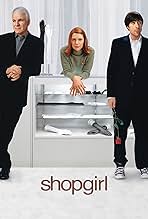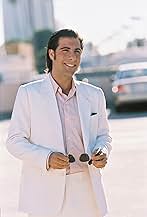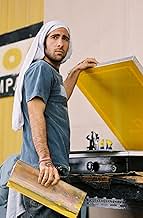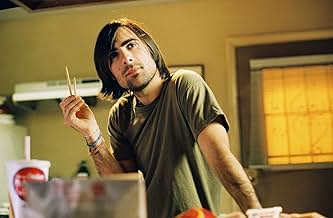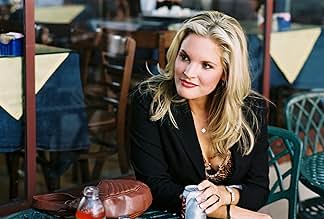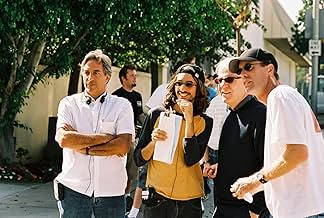Shopgirl
- 2005
- Tous publics
- 1h 46m
A film adaptation of Steve Martin's novel about a complex love triangle between a bored salesgirl, a wealthy businessman and an aimless young man.A film adaptation of Steve Martin's novel about a complex love triangle between a bored salesgirl, a wealthy businessman and an aimless young man.A film adaptation of Steve Martin's novel about a complex love triangle between a bored salesgirl, a wealthy businessman and an aimless young man.
- Awards
- 1 win & 7 nominations total
- Hot Tears Band Member
- (as Johnny Fedevich)
Featured reviews
Vermont transplant Mirabelle Butterfield is an undiscovered artist working as a sales clerk at Sak's Fifth Avenue in LA. Unfulfilled and lonely (even her cat won't come out to greet her upon returning from a day's work)she meets and dates two completely different men. Jeremy is a man child that finds wonderment in neon signs and sees no problem in using plastic sandwich bags for a condom. Then there's sophisticate Ray Porter who has homes in LA and Seattle and gets around by private jet. Jeremy is quickly jettisoned once Mirabelle feels she has something more serious and tangible in her relationship with the wealthier and older Ray so he gets a job as a roadie and goes on tour with a rock band. Meanwhile Ray's feelings remain ambiguous. It eventually goes bad in the most mannerly of fashion just in time for the freshly scrubbed Jeremy to reappear.
Shopgirl has a sleek trendy look to it with it's stylish sets and well heeled characters roaming the upscale store, chic museums and fine restaurants as well as Porter's sterile residences. But the film plods along at an uninteresting pace because the film never really gets deeply into the characters. Without the interior monologue of the novella director Anand Tucker seems content to allow his characters to tell their stories with wan expressions of joy and sadness. To make sure you don't miss these telling glances he spends a lot of time overusing slow motion and employing a prodding music score to bring some life to the characters.
Claire Danes does what she can with the glum Mirabelle and it's not a whole lot since Tucker seems content to just film her pretty face in a series of reactions. She and Martin have some decent scenes with each other (especially when she attempts to cut back on her anti-depressent)but the relationship for the most part is tepid. Steve Martin is a disaster as Ray lacking the actors chops to show any emotion, even the restrained variety that the non-committal Porter protects himself with. In order to balance these dull lifeless creatures Tucker and Martin turn Jeremy (Jason Schwartzman) into a lovable shaggy dog, cutely clueless and upbeat.
Shopgirl is Woody Allen territory without the comic irony and Erich Rohmer land without the introspection or depth of character. It's well mannered has a nice veneer but lacks the energy to ever really take off. Jeremy and Ray are cliché polar opposites, (old wild and crazy Steve versus the mature and refined Steve)but naturally caring and compassionate in their own way. Martin and Tucker refuse to employ negative capability to either character thus diluting the film's somber dramatic tone even more. Ray's passive interest lacks edge in either direction and the selfishness of his actions are betrayed by the makers need to almost make him as sympathetic as Mirabelle, thus stealing her thunder and reason to rage. It undermines Shopgirl which drably plays it safe from beginning to end.
This film is about how sometimes a man, who evidently is a successful business person, can't see what he does to a woman who, in spite of the warnings, has fallen deeply in love with him. Ray Porter, is an egotistical man, incapable of expressing his emotions unless they are in the form of material things. Ray is an empty man who can buy whoever he wants to be with, but who demands there will be no strings attached to any sort of relationship.
Mirabelle, the young gloves sales lady at Los Angeles' Saks 5th Ave., is a lonely girl who has relocated to the city from Vermont. It's hard for anyone in that environment to connect with people, especially in a place like L.A. where no one talks to one another and everyone seems to be impressed with celebrities that are to be seen everywhere. Mirabelle is destined to a life of loneliness until two men appear at about the same time, the goofy Jeremy, and Ray Porter.
Jeremy likes Mirabelle in his own crazy way. Mirabelle responds to him because he means easy companionship without complications. When Ray appears on the scene, Mirabelle has no clue about what she is getting in for. Before anything, Ray makes it clear he wants no commitment, and no attachment. It's just a convenient situation for him as he has calculated that Mirabelle is perhaps a sexual diversion, at best. He finally reveals what he really has in mind when he tells the girl his intentions for the New York apartment, something that he hasn't included her in, at all.
This bittersweet story comes alive because of Claire Danes great performance as Mirabelle. Ms. Danes is perfectly cast as Mirabelle. Steve Martin's characterization as Ray Porter, is superb in his take about this man. Mr. Martin clearly understands what this man is really like and what makes him tick. Both these actors contribute to making their characters feel real.
On the other hand, the goofy performance from Jason Schartzman is distracting from the other story. The best sequence involves the beautiful Bridgette Wilson in thinking Jeremy is the real Ray Porter.
The excellent cinematography by Peter Suschitzky gives "Shopgirl" a sophisticated look that goes perfectly with the story being told. Anand Tucker directed with elegance and a sure hand making the film a winner.
It's also no real secret that many of his recent films have been far from great.
So, still having faith in the man, and having loved the novel on which this film is based, I went in to the cinema desperately wanting to like it, but expecting to be disappointed. Largely, I was pleasantly surprised that the novel did transfer well to the screen.
Some of the credit for this belongs to director Anand Tucker, who has created some powerful images of the hustle and bustle of the LA that Martin describes in the novel, and contrasts it well with the characters who lead shallow lives, trying to be something meaningful amongst all the chaos.
Credit also goes to the actors who show that longing that drives the situation: Claire Daines as Mirabelle clearly WANTS to be social, artistic, loved; Jason Schwartzman as Jeremy WANTS to be sensitive, witty, lovable; Martin as Ray Porter clearly WANTS to be suave and considerate. Without having many jokes in the script, audiences can still appreciate the humour by seeing these pathetic struggles. When I saw it there was plenty of laughter at all the right moments.
I will, however, hasten to add that there are parts of the book that never would have translated well to the Hollywood screen, and the praise that some give the movie for serving its purpose will contain the same reasons that others wish to knock it. The book's strength is that one can feel for the characters because they are portrayed as superficial people and their lives and conversations are so shallow in comparison to the narrative that sets them up. The reasons why it works so well as a book could well be the very things that cause it to not work on the screen. Then there's the matter of a book that's so rooted in "LA sux" sentiment being made into a Hollywood movie. So maybe the musical overkill reeked of "excuse me, we're trying to tell you something". Maybe the spots of narration felt out of place and indicated that Martin is not yet over his desire to spend his life as the 'star' of his projects (him getting top billing for the movie was also a bit much, in my opinion).
Ultimately, maybe the audience members who were longing for a film with more 'depth' and 'substance' were in actuality sharing the characters' longings for the same in their own lives. Maybe the 'criticisms' are in fact backhanded compliments that the film is largely doing just what it's meant to do.
The relationship between Ray and Mirabelle is, of course, a transaction. Ray is what used to be called a sugar daddy. He knows it, and within the limits of that role he is apparently a generous and considerate keeper. We aren't given Ray's back story, but it is not hard to guess that a symbolic logician who made a fortune in computers might have been socially challenged, to put it mildly, as a young man, and suffered a good deal of rejection from women. He can now buy what he couldn't then woo, but experience has taught him never to relinquish control and never to let himself be vulnerable. A few hundred million dollars have cleaned up his exterior nicely and given him power over his surroundings, but the inner nerd is still there.
Mirabelle certainly appreciates the value of what Ray can do for her. Consider the shot in Vermont where she gazes at her dried out, prematurely worn mother and decides she'll meet Ray in New York after all. But Mirabelle refuses to admit to herself that she is only being kept. We are meant to think the better of her for her self deception. The sluttish, annoying and frankly mercenary but cheerfully self aware Lisa is there to draw an unfavorable contrast with Mirabelle. Paradoxically, it is Mirabelle's self-deceived integrity, and her refusal to use the crude manipulations Lisa suggests, that make her a more exquisite ornament for Ray -- gourmet arm candy for a man with the finest taste. Both women are punished for self deception, but Lisa suffers only comic humiliation while Mirabelle sets herself up for real pain.
Jeremy has the makings of a Ray in him, but we are meant to believe that he has -- implausibly -- attained emotional enlightenment, if not the capacity for articulate speech or sustained rational thought. He has earned Mirabelle, we are told, because he has remade himself to be worthy of her. Love may not conquer all in this bittersweet anti-romance, but it still does better than break even.
Did you know
- TriviaFor the scene in Mirabelle's bedroom where the cat jumps on the bed and watches her and Jeremy, there were actually two cats used. The director explains in his commentary that one could jump but never watched, and the other was good at watching but couldn't jump.
- GoofsThe card that Ray sends to Mirabelle reads "I would like to have dinner with you" in block print, with a signature at the bottom. When we see this card again at the very end of the movie, the signature has been replaced by "Ray Porter" in block print.
- Quotes
Ray Porter: As Ray Porter watches Mirabelle walk away he feels a loss. How is it possible, he thinks, to miss a woman whom he kept at a distance so that when she was gone he would not miss her. Only then does he realize that wanting part of her and not all of her had hurt them both and how he cannot justify his actions except that... well... it was life.
- ConnectionsFeatured in Late Show with David Letterman: Episode #13.53 (2005)
- SoundtracksLily & Parrots
Written and Performed by Mark Kozelek
Published by God Forbid (BMI)
Courtesy of Jetset Records
Details
- Release date
- Country of origin
- Languages
- Also known as
- 灰姑娘的愛情手套
- Filming locations
- 2250 Apollo Dr., Los Angeles, California, USA(Ray Porter's home.)
- Production companies
- See more company credits at IMDbPro
Box office
- Budget
- $10,200,000 (estimated)
- Gross US & Canada
- $10,284,523
- Opening weekend US & Canada
- $229,685
- Oct 23, 2005
- Gross worldwide
- $11,675,161
- Runtime
- 1h 46m(106 min)
- Color
- Sound mix
- Aspect ratio
- 2.35 : 1







